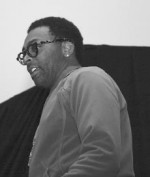Speech turns Sun Dome into a Spike Lee joint

In front of a full audience in the Sun Dome Corral, Spike Lee confessed that his first film – an ill-conceived action-packed thriller – didn’t flop in the box office – it never even made it to production.
Early career struggles was one of the main points of Lee’s talk, called “Celebrating Black History Doesn’t End in February,” presented by the University Lecture Series (ULS) on Tuesday night.
Although Lee is best known for his films’ gritty social commentary, his speech had little to do with his films.
“I don’t try to spell every little thing out for the audience. Not all of the characters are good or bad, they’re complex human beings,” he said.
Lee was also thankful for and critical of the role parents play in both his and students’ lives.
“Parents kill more dreams than anybody. Every parent wants more for their children than they had; if you’re not strong, you’re going to succumb to your parents and end up living a life you hate,” he said.
While he emphasized finding a career that is more pleasure than business, he was relatively pragmatic about the unforeseen circumstances and responsibilities that can arise.
“Because you have a family, a roof over your head and food on the table, you go there every day. The majority of people go to their graves being slaves to their jobs; you have to find what you love,” he said.
He also stressed patience and dedication to finding an ideal career.
“A funny thing happened to me. I succumbed to the dreaded disease of overnight success. I would just sit by the phone all day because I know somebody would call … funny thing happened, (the phone) got turned off.”
While Lee said he didn’t always have a defined direction during his life, he said he discovered his passion for film as an undergraduate at Morehouse College in Atlanta, Ga. After Morehouse, he realized he hadn’t fully grasped all the skills he needed to be a director and enrolled in New York University’s Tisch School of the Arts.
Lee also spoke openly of his support for Sen. Barack Obama and his hope for a successful campaign.
“We live in an amazing time. The world is going to change tomorrow, and maybe this country will be able to reach the loftiness of democracy we always talk about,” he said.
Although the audience agreed with Lee’s hope for change, they sat silently as he presented them with an ultimatum.
“It’s going to be all on you. Your skills have to be tight and you have to get your focus now. There’s a recession, people are losing their jobs and homes left and right,” he said.
Lee was critical of the media throughout his speech, especially concerning the recent publication of a picture of Obama in Kenya wearing traditional Somali garb.
“All of this negativity is put out by the media – we have to rise above its influence,” he said.
While he ended his speech with a question-and-answer session, many of the audience’s questions inspired comments beyond the original inquiries. Lee kept his answers focused on the pursuit of education. Although he did not mean “education” in a classical sense, his emphasis was on perseverance and self-reliance.
“A lot black people are criticizing each other for going to school, calling people trying to get an education ‘white boy’ or ‘white girl,'” he said. “Run away from those people.”
At the end, Lee named his speech “Education.” Recalling his early career at NYU – and using his classmates as his crew – Lee filmed the New York City blackouts and the looting that followed, much of which was his inspiration for future films like Do The Right Thing.
“When I told friends I wanted to be a filmmaker, I might as well have said I’m walking to the moon. Thankfully there were people there to support me and not look at me like I was crazy,” he said.






